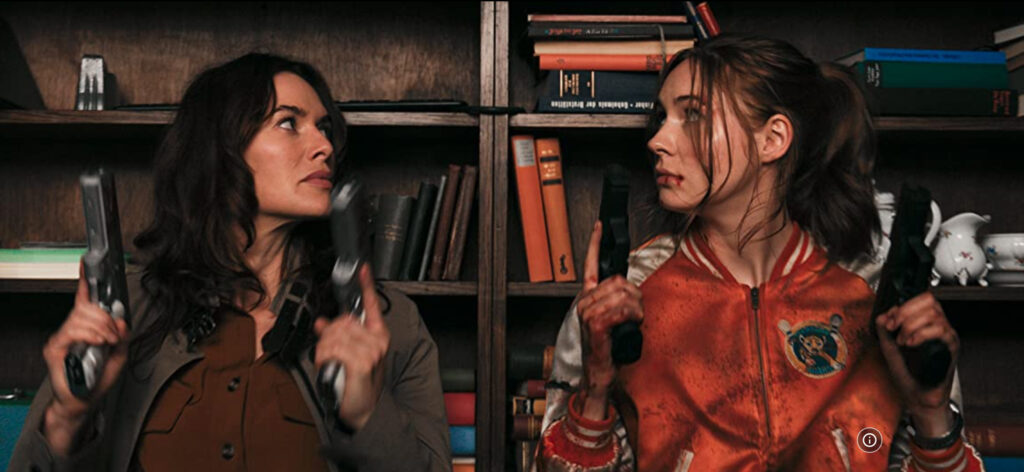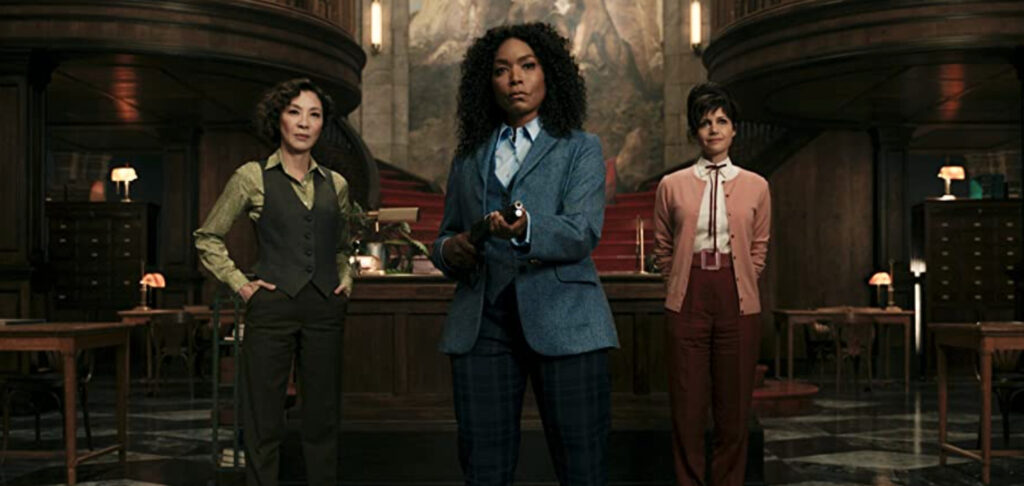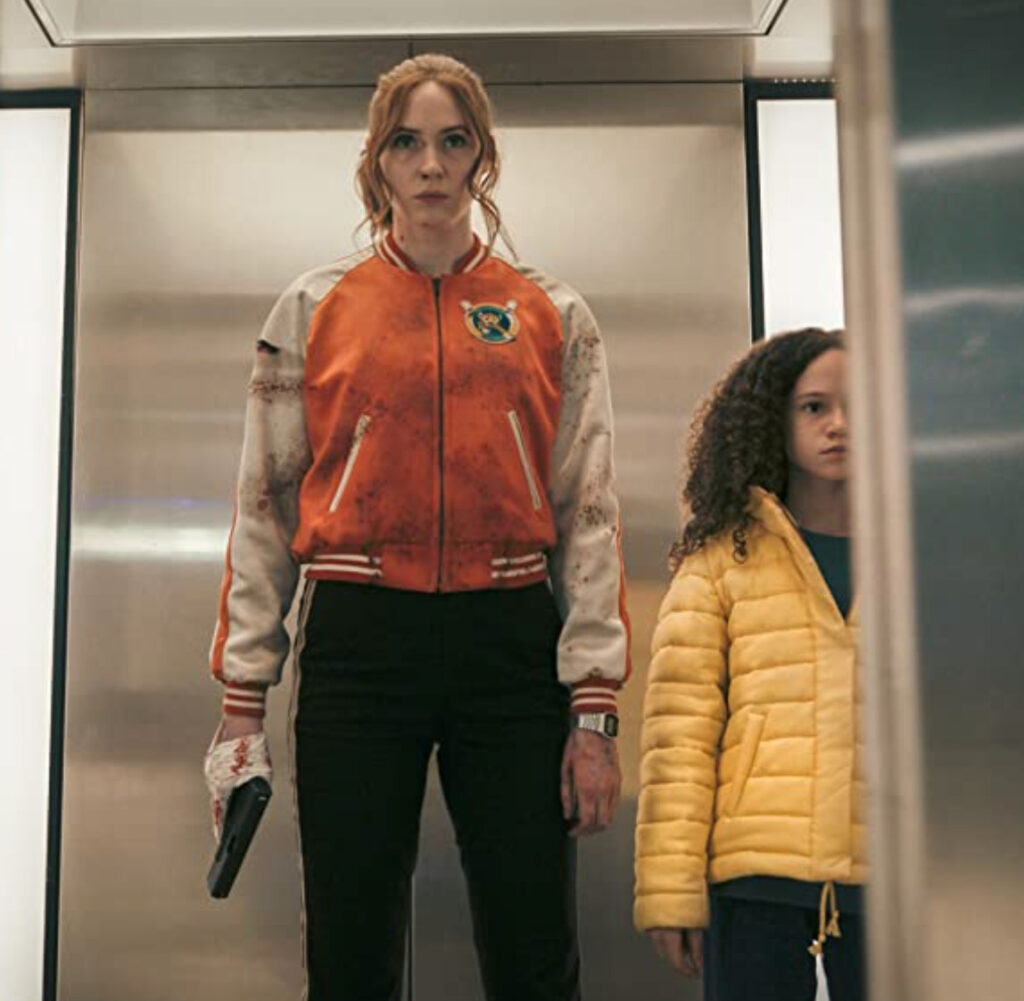“Gunpowder Milkshake” is a Blood-Splattered Blueprint for an Action Matriarchy.

Sam (Karen Gillan) is an elite assassin working for a criminal operation known as The Firm. She’s on thin ice with her bosses and when she eschews her latest hit job to rescue 8 year old Emily (Chloe Coleman), she becomes the target of an army of male hitmen sent by her own employers. For assistance she turns to the Librarians, a group of elite female assassins and her own estranged assassin mother. Three generations of women band together to confront a masculine system of crime and brutality in Navot Papushado’s candy colored shoot ‘em up. The film’s hyper-stylized charm and creative action sequences more than make up for its messy plot and occasionally sluggish pacing and Gunpowder Milkshake is a brutal and empowering battle between the patriarchy and a matriarchal system of empathy and strength.
Answering the call of last year’s Birds of Prey, Papushado delivers a stylish and slick action movie centered on a group of empowered women. But Gunpowder Milkshake is explicit with its message of matriarchal superiority and directly confronts the historically misogynistic ideology of the action genre. While its worldview is admirable, an overreliance on slow motion and some clunky dialogue keeps the film from ever really hitting its stride. Several plot points defy logic and the thinly fleshed out story often feels like interludes between set pieces, rather than a linear narrative. But those set pieces pay off in spades and Papushado delivers stunning fight sequences that brilliantly showcase the strengths of his iconic actresses. Standouts include a hallway fight where Sam must defeat three boneheaded hitmen without the use of her arms and a breathtaking library battle set to Janis Joplin’s Piece of My Heart.
Gillan helms the film as an assassin rapidly disillusioned with the callous company she works for. Her employer The Firm is a faceless criminal organization thinly disguised as the patriarchy itself. They are represented by Nathan (Paul Giamatti), a father figure of sorts for Sam who tries to protect her from his bosses, but ultimately sees her as expendable and quickly betrays her to protect his interests. Reuniting with her estranged assassin mother Scarlet (Lena Headey), and the Librarians Anna May (Angela Bassett), Florence (Michelle Yeoh), and Madeleine (Carla Gugino), Sam breaks from the male system of control that callously sends her to clean up their messes. She embraces the empathy and human connection of the Library over the Firm’s mindless destruction. Legendary actresses Bassett, Yeoh, and Gugino are thrilling to watch as they effortlessly shift between approving aunts to lethal fighters. Headey is magnetic, returning to familiar ground as a complicated mother willing to fight tooth and nail for her child. The chemistry between the women is electric especially during the fight sequences, but there’s a history hinted at but never explained that keeps some of the emotional beats from fully landing. While thrilling, it feels like scratching the surface of a much larger world that will hopefully be fleshed out in sequels.

Though much of Gunpowder Milkshake is hyper stylized, Papushado resists fetishizing the women at the story’s core. Sam vocally refuses to be typecast by the three Librarians based on her weapons of choice. It’s an endearing scene that directly confronts the action genre’s lazy tendency to essentialize its heroes, leaning on a signature weapon or quirk over an actual personality. Neither are they sexualized, with costumes ranging from feminine to androgenous, but never overtly sexy or revealing. Sam stitches up her own arm wound, but does not strip to examine bodily injuries. The male gaze is nowhere to be found, and Papushado instead presents his characters with unique, but not reductive looks.
Gunpowder Milkshake presents a clear matriarchal structure of leadership in Scarlet and the Librarians. Though Sam and Scarlet are mother and daughter, other connections are not based on familial bonds, but a shared mission and ideology. Sam feels a strong connection to Emily who self-identifies as her apprentice, but her feelings for the child are likely due to painful memories of abandonment by her own mother and guilt over causing the death of Emily’s father rather than any maternal instinct of her own. Milkshake offers a nuanced understanding of motherhood as Madeleine seems to genuinely care for children though she does not have any of her own, excitedly describing the library’s children’s sections and relishing the return of a child to the building. But her nurturing tendencies do not overtake her personality, reminding us that women can be both strong and maternal at the same time and that it’s possible to enjoy children without wanting to base one’s entire life around raising them.
Most of the Milkshake’s men are disposable but, Ralph Ineson rises to the top as Jim McAlester, a crime boss seeking Sam’s head as retribution for his son’s death. Though he doesn’t have much to do, he delivers a monologue that could easily be seen as the film’s mission statement. A father of many daughters, he mourns the death of his only son which leaves him the sole male in his household again. He sees his daughters as beloved creatures that he is incapable of understanding, mentally setting them apart from his son whom he is able to fully connect with. This dehumanization is sadly familiar and an indictment of many fandom ideologies that see male action heroes as human, but fail or even refuse to engage with empowered female characters. Though their world is thinly drawn, the women of Gunpowder Milkshake are fully human. They form real connections with each other and survive based on the strength of their relationships rather than the numbers of their army.
The film’s relatively quiet ending may leave some fans wanting, but is representative of actual feminist goals. Though she could easily kill Nathan, she chooses to let him live, offering peaceful co-existence that will benefit them both instead of a deadly fight for dominance. Most women want equality, not retribution. We don’t want dominance, but unqualified acceptance and the freedom to live as we choose. Though far from perfect, Gunpowder Milkshake could be seen as a response to decades of action films that essentialize women, holding a few up as ideal, but refusing to see any as human. Its vision offers a way forward where empowered women are allowed to be soft, nurturing women are allowed to be callous, and empathy is valued alongside strength.
Your move, Hollywood.
Jenn Adams
